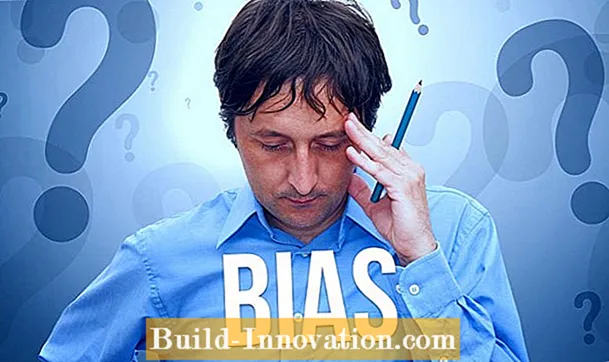Bias: You should know these 7 cognitive biases

Content
- Definition: what is a bias and how does it arise?
- How do such distortions arise?
- What are the reasons for bias?
- List of typical bias
- Interviewer bias
- Confirmation bias
- Hindsight bias
- Selection bias
- Availability bias
- Ingroup bias
- Authority bias
Many people are convinced that they are acting in an absolutely rational and unbiased manner. This has to do with their positive self-image. Prejudices are frowned upon by society and of course you are always the notable exception yourself. In fact, it is often the distortion of one's own perception that strikes. Of a Bias is the talk then. Your own perception, but also memory, thinking and the judgments made accordingly are unconsciously influenced by certain basic assumptions. What bias there is and how you can prevent it ...
Definition: what is a bias and how does it arise?
Anglicism Bias means something like bias, inclination, prejudice in German. According to the Duden, the noun is interpreted as a neuter in German, even if it is the bias or the cognitive bias is called, still will the bias said.
The term originated from opinion polls and denotes a distortion. Such distortions can be caused by a systematic error - for example, a sample was not representative. A wide variety of biases are possible, especially in the context of surveys.
Another example: A poll on xenophobic attitudes is launched. Depending on how the questions are asked, it is immediately clear to the respondent what a question is aimed at. Now most people are familiar with a society Norms and values familiar - even if they don't necessarily all carry them away.
Particularly in the case of personal surveys, this can lead to answers after social desirability (Social bias) and not based on what the respondent actually thinks. Some bias cannot be traced back to specific causes; it is then referred to as random bias.
How do such distortions arise?
On the one hand, these cognitive distortions are absolutely human. Rattle every day tons of information on the human brain, all senses are flooded with details. Is it cold, if so how cold? What day of the week is today, what appointments are pending, the phone rings, ten new emails come in, and so on.
You need to make decisions based on this information. Many of them run routinely and almost unconsciously ab: You know that when it rains you have to take an umbrella with you, based on experience you know which e-mails you should reply to immediately and which ones still have time.
We also get involved in dealing with other, strangers specific program (polite greeting, introducing yourself, friendly body language and facial expressions). Our brain has acquired a certain efficiency; cognitive abbreviations (also called heuristics) are taken on the basis of certain experiences.
The result is what is known as a thinking drawer or pigeonhole thinking and which makes everyday (work) life a lot easier. Because if the same amount of energy had to be expended on every decision, regardless of whether it is about choosing the right jacket or a million dollar deal, then you would never come to Potte.
What are the reasons for bias?
In plain language: you make some of your decisions routinely based on experience and intuition, for the other part like non-everyday million dollar deals, take your time and reflect.
The problem is that in the routine part, various biases can come into play without our being aware of it. Because of course everyone tries hard to be free from prejudice professional decisions hold true. With a view to the work context, this is not only desirable, but required by law: Anyone who disregards the AGG can expect corresponding consequences.
Still, an unconscious bias can lead us to deceive ourselves. If we come back to the example of opinion polls, there are several ways in which a bias can arise. One reason already mentioned is that Fear of sanctions, which is why the answer is not what a respondent actually thinks, but what is socially accepted.
In this case it is a deliberate misstatementbecause the truthful answer is embarrassing. It is also possible that your memory has actually deteriorated and you state something wrong. Or you simply express yourself so vaguely that a misunderstanding arises.
A classic example of a distortion of the “examination results” is an observation situation: Is that Boss present at the moment, of course, all employees work with great concentration, the desk is perfectly tidy and nobody goes to the toilet.
List of typical bias
In the following, we will introduce you to the most well-known biases as you can observe them again and again in everyday life:
-
Interviewer bias
Interviewer bias describes falsifications and distortions that occur in interview situations. They are evoked by the way the interviewer asks questions. For example, certain, desired answers can be forced through suggestive questions.
Read more about this here:
- Interviewer bias: That's how dangerous he is in the application
-
Confirmation bias
Also known as confirmation bias, confirmation bias is due to another human weakness. People are far too happy to see their own convictions confirmed by others. So instead of having to discard our own basic assumption through detailed research, more precise analysis of already available information, we want to read that we are right.
This means that certain information is already selected under a certain filter and suitable arguments for one's own perception are found. There is no search for contradicting evidence in the first place, existing assumptions are thus reinforced.
Read more about this here:
- Confirmation bias: That is how dangerous the mistake of thinking is
-
Hindsight bias
The hindsight bias is also known as a backsight bias. People tend to overestimate their own ability to predict events and see through facts. This then leads to statements such as “I knew it from the beginning!” Or “That was clear, it couldn't work!”, With which this person ascribes a quasi prophetic gift.
Interestingly enough, she did not do anything in advance to avert the - mostly negative - event. This has to do with the fact that this person strongly falsifies their own predictions in their memory.
Read more about this here:
- Hindsight Bias: Why we seldom learn from mistakes
-
Selection bias
Selection Effect or Selection Bias is what happens when you work methodically inappropriately. Because sampling is about different, random samples. However, due to a systematic error, the sample is no longer representative. As a result, the features are no longer distributed as they are in reality. The probability of getting a neutral and representative statement about Germany's most popular football club in Dortmund's city center is rather low.
Read more about this here:
- Selection bias: How to avoid it
-
Availability bias
The availability bias is also referred to in German as the availability heuristic. This bias creeps in when we have to judge how important or likely an event is, how often it is likely to occur. Because reliable information - for example in the form of statistics - is missing, people rely on their own experiences or reports in the mass media.
This leads to complete misjudgments - the best example: a house in your neighborhood was robbed. With this in mind, many will estimate the likelihood of falling victim to a break-in to be significantly higher, i.e. without.
Read more about this here:
- Availability bias: That is why we misjudge dangers
-
Ingroup bias
Many already know this phenomenon from school. Ingroup bias means that we tend to favor members of a group over outsiders. Who we perceive as a member of a group to which we belong, we automatically find more sympathetic. This cognitive distortion is very interesting with regard to group dynamic processes: How do group conflicts work out and what led to their emergence?
Read more about this here:
- Ingroup bias: Psycho trick for a better judgment
-
Authority bias
Finally, authority bias describes the tendency that some people weight statements particularly heavily if they come from an authority. Other terms for it are belief in authority or - especially on a political level - authority thinking, authority. On the one hand, this bias is only too understandable: Parents and teachers are the first role models and in later life there are always people who have extensive expertise based on years of experience, research and further training.
However, it is important that you maintain your critical thinking, because even supposed experts can be wrong. Just because someone is in a hierarchically superior position does not mean that they are free from faults.
Read more about this here:
- The 4 phases critical thinking



